
It pays to plan ahead
Preplan your own funeral arrangement online in minutes
Arrange Immediate
Cremation Services
Cremation Services
Speak to our dedicated care specialists now
Losing someone you love is overwhelming enough without the weight of unexpected costs. Many families find themselves unprepared for funeral expenses, unsure where to turn for help.
There are several charities and government agencies that give families help with funeral costs when they can’t pay on their own.
In this article, we’ll cover:
- 8 Charities that help with funeral costs
- How different kinds of funeral assistance work, from direct aid to discounted services
- What to do if you’re still struggling to afford a funeral, plus affordable planning options through After.com
The 8 Best Charities That Help With Funeral Costs
- The TEARS Foundation: Best for Infant and Child Funeral Assistance
- Final Farewell: Best for Free or Discounted Child Burial Services in Pennsylvania
- FEMA Funeral Assistance: Best for Disaster-Related Funeral Cost Reimbursement
- Catholic Charities: Best for Faith-Based Burial Help and Wraparound Support in North Carolina
- GoFundMe: Best for Raising Funeral Funds Quickly Through Community Crowdfunding
- Funeral Consumers Alliance: Best for Saving Money Through Education and Consumer Advocacy
- State & County Burial Aid: Best for Local Government Funeral Help When No Other Options Exist
- Military Burial Benefits for Veterans: Best for Honoring Veterans with Financial and Ceremonial Funeral Support
Do you need advice ASAP? You can begin arrangements directly on After’s website or speak with a live care specialist who is available 24/7. Call us at 844-717-5170.
How After Gives Affordable End-of-Life Support
After.com: Best for low-cost cremation services funded through Lilypay
Lilypay allows you to take out a flexible loan for the cremation and then use crowdfunding to cover that loan. Go to the Lilypay Community Gardens pages to learn about how to easily set up your profile for receiving donations.
Who it’s for: Those looking for a simple, dignified cremation without upsells or surprise fees
Pricing: $995 flat-rate cremation package
The After team doesn’t make you navigate funeral home appointments or sales pitches. Simply go online, choose After’s $995 package, and arrange the cremation with just a few clicks. A care specialist walks you through paperwork and next steps.
This process saves thousands compared to local funeral homes. Many more people now choose cremation instead of a burial for a lot of reasons.
Features:
- Honorable direct cremation handled with compassion
- Transportation within 30 miles of the place of death
- Permits and necessary paperwork included
- Support from a dedicated care specialist to guide you through the process
- Temporary urn available upon request
- Refrigeration for up to five business days
- Basic cremation container provided
- Online obituary listing included
- Access to after-grief support resources
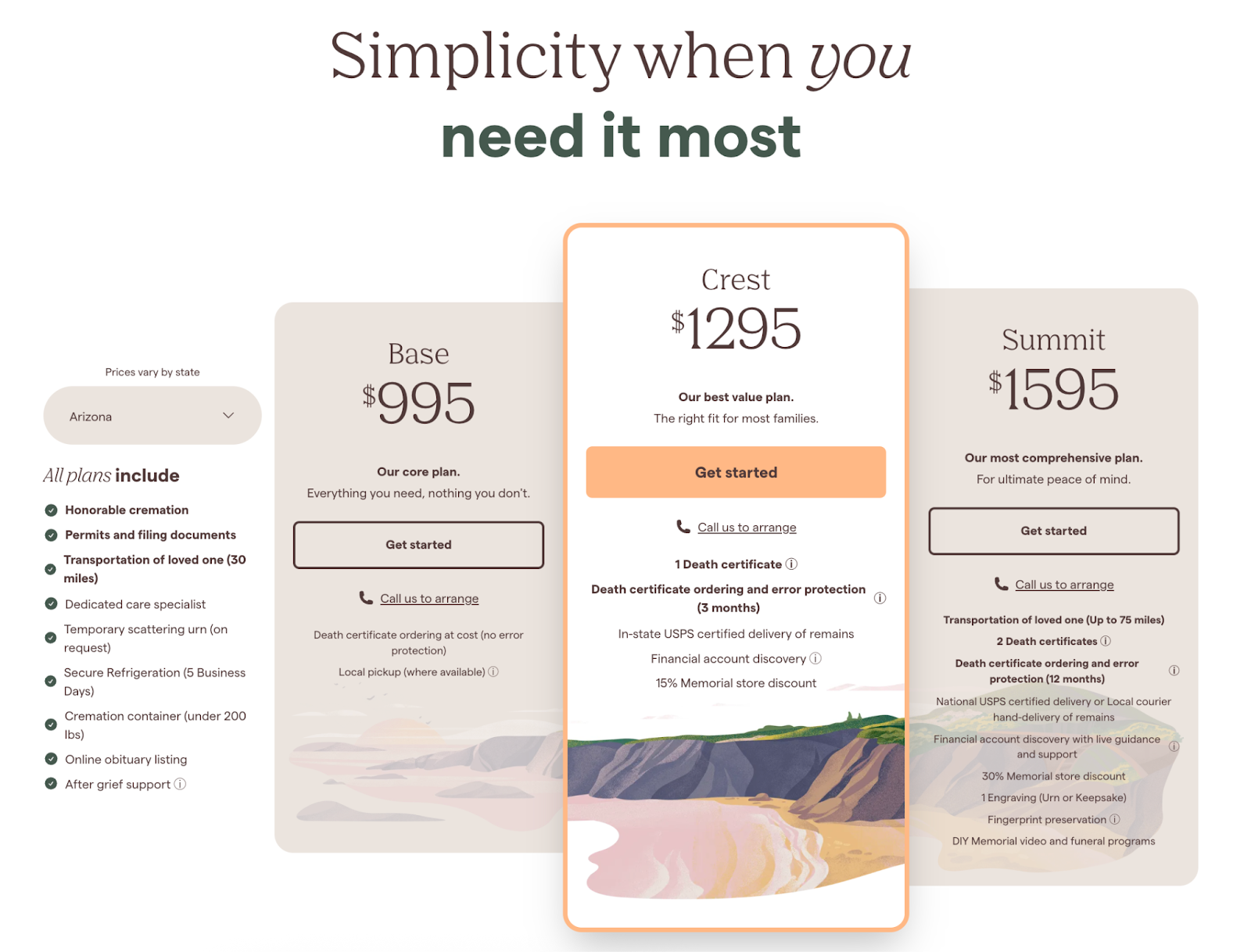
Pros:
- One of the most affordable online cremation options, starting at $995
- Transparent, itemized pricing prevents surprise costs
- Entire process is available to do online, reducing stress and in-person visits
- Compassionate guidance for families unfamiliar with end-of-life processes
- No pressure to purchase extra services or products
Cons:
- Base package excludes the death certificate and delivery of remains (pickup only)
- Only operates in 8 states currently, though planning to expand
- Longer-distance transport may require upgrading to higher-tier plan
After allows you to choose from three direct cremation packages that keep costs predictable and transparent.
Our packages start at $995 for families who want affordability without extra services. All packages include essential services. We arrange transportation of the deceased within a set distance, manage permits and paperwork, and provide refrigeration for up to five business days.
After also offers grief support resources. Dedicated care specialists guide families through each step and ensure families never feel pressured to buy services they don’t want.
We operate online to lower the overhead costs that traditional funeral homes face. This model helps keep our prices affordable. It also prevents the unexpected fees that often come with in-person arrangements.
{{cta_blue}}
The Best Charities That Help With Funeral Costs: Quick Comparison
1. The TEARS Foundation: Best for Infant and Child Funeral Assistance
Who it’s for: Families grieving the loss of a baby or child who need help with cremation costs or funeral expenses
Pricing: Assistance varies by program and region. The foundation pays the funds directly to funeral homes.
Features:
- Financial aid for funeral costs for babies and children up to age 22, depending on cause of death and location
- Programs include help with funeral expenses, grave markers, and sometimes grief counseling support
- Covers families across many U.S. states, with eligibility based on where the family resides or where the child passed away
- Submit applications online, with responses promised within 48 hours
- Families can share a photo of their child for inclusion on the TEARS Remembrance Page, honoring their memory publicly (optional if unavailable)
- Assistance paid directly to funeral homes, reimbursements for already-paid expenses are not available
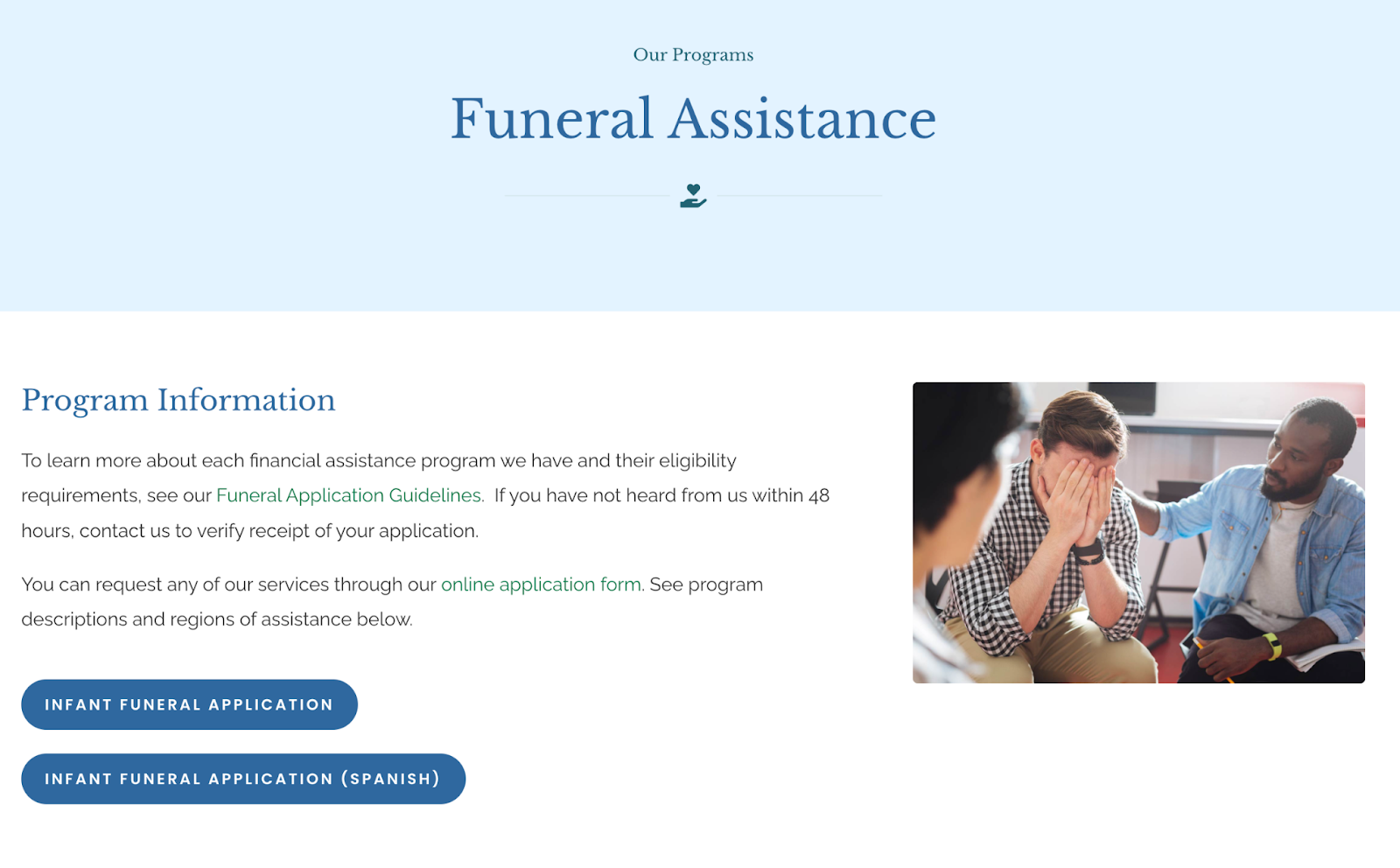
Pros:
- Specializes in supporting bereaved parents facing the devastating loss of an infant or child
- Offers multiple programs tailored to age ranges and causes of death
- Compassionate, community-based organization founded by a parent who understands the need firsthand
- Applications available in English and Spanish
- Quick response time, typically within 48 hours of application submission
Cons:
- Assistance is strictly for funeral expenses of infants and children rather than adults
- Only available in certain U.S. states and regions
- Requires coordination with funeral homes and submission of official documentation
- Funds go directly to funeral providers; families cannot get reimbursed for costs already paid out-of-pocket
(Note: For financial aid, TEARS requires families to provide details from the funeral home, and cannot offer reimbursement for expenses already incurred.)
2. Final Farewell: Best for Families Needing Child Burial Support in Pennsylvania
Who it’s for: Families struggling to afford funeral and burial costs for a child, especially those in Pennsylvania.
Pricing: Assistance varies. Some families may receive full funeral services at no cost
Features:
- Financial aid specifically for funeral and burial expenses for children
- Primarily serves families in the greater Philadelphia area, but has helped families across Pennsylvania and the U.S.
- Works with funeral homes, cemeteries, and vendors to negotiate “at-cost” services or secure in-kind donations
- Offers practical advice and guidance to families navigating funeral planning during grief
- Operated entirely by volunteers with no salaried staff, ensuring donations go directly toward helping families
- Eligible families may receive full funeral services, including burial, free of charge in the most extreme financial hardship cases
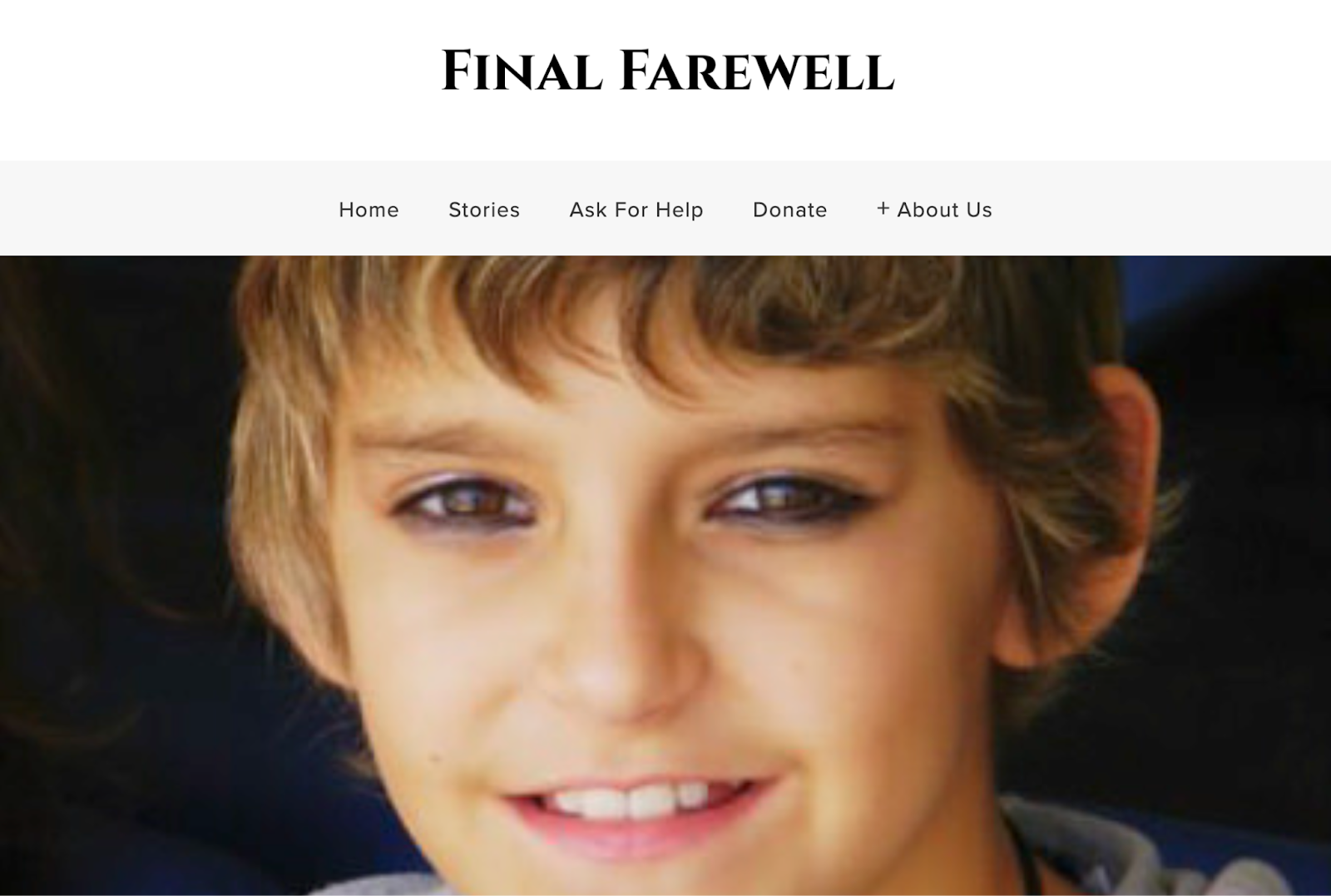
Pros:
- Dedicated exclusively to easing funeral costs for grieving families who’ve lost a child
- Deep community connections in Pennsylvania to secure discounted or donated funeral services
- Welcomes families from all religious and cultural backgrounds
Cons:
- Primarily focused on the Philadelphia region, so national assistance may be limited compared to local support
- Assistance is only for funerals of children, not adults
- Applications and support processes may involve coordinating with multiple service providers, which could feel overwhelming for some families
3. FEMA Funeral Assistance: Best for COVID-19 Funeral Cost Reimbursement
Who it’s for: Families who paid funeral costs for someone who died of COVID-19 or another federally, state, or locally declared disaster in the U.S.
Pricing: Reimbursement up to $9,000 per funeral for COVID-19-related deaths, maximum $35,500 per application per state. Amounts vary for other disasters based on local declarations
Features:
- Offers reimbursement for funeral expenses tied to COVID-19 deaths occurring on or after January 20, 2020, as well as other federally, state, tribal, or territory-declared disasters
- Assistance available nationwide, including U.S. territories and the District of Columbia
- Covers both direct and indirect disaster-related deaths. For example, someone who suffered a fatal injury or medical crisis while evacuating from a disaster zone
- Funds paid directly to the applicant who incurred funeral costs, not to funeral homes
- Eligible expenses include transfer of remains, casket or urn, a burial plot or cremation niche, marker or headstone, interment, funeral services, and costs of producing and certifying up to five death certificates
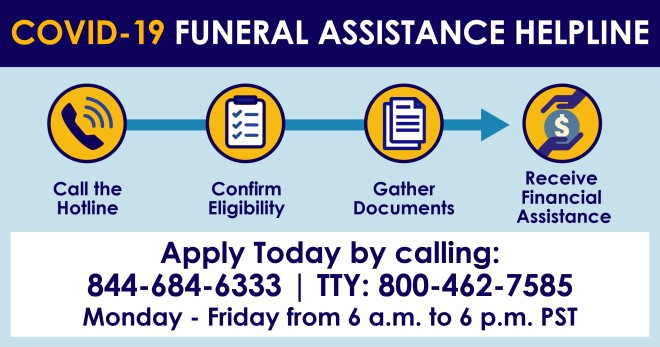
Pros:
- Substantial reimbursement for COVID-19 and other disaster-related funeral costs
- No income restrictions for eligibility
- Covers a broad range of necessary funeral and burial expenses
- Available nationwide with multilingual support for applicants
- Can assist with both already paid and documented future funeral costs
Cons:
- Only available for deaths tied directly or indirectly to disasters, including COVID-19
- Requires significant documentation, such as death certificates and receipts
- Applications must come from the person who paid the expenses, not funeral homes
- Excludes expenses considered non-essential, such as flowers or obituaries
(Note: Families who haven’t yet applied for FEMA’s COVID-19 Funeral Assistance have until September 30, 2026, to submit their applications. For details, visit FEMA’s Funeral Assistance page or call 844-684-6333.)
4. Catholic Charities: Best for Faith-Based Burial Support in North Carolina
Who it’s for: Catholic Charities offers burial assistance for low-income families who need help affording a funeral or burial.
Pricing: Assistance of up to $5,000 available per family in qualifying cases.
Features:
- Financial assistance for funeral and burial expenses for those unable to afford traditional costs
- Works directly with local funeral homes to secure reduced-cost services through pre-negotiated agreements
- Covers services including transportation of the deceased, a basic casket or cremation container, private family viewing, graveside services, and burial or interment
- Includes support for filing the death certificate and providing one certified copy
- Program funded through donations, including significant contributions from anonymous donors
- Case managers respond within 48 hours to connect families with assistance and other resources
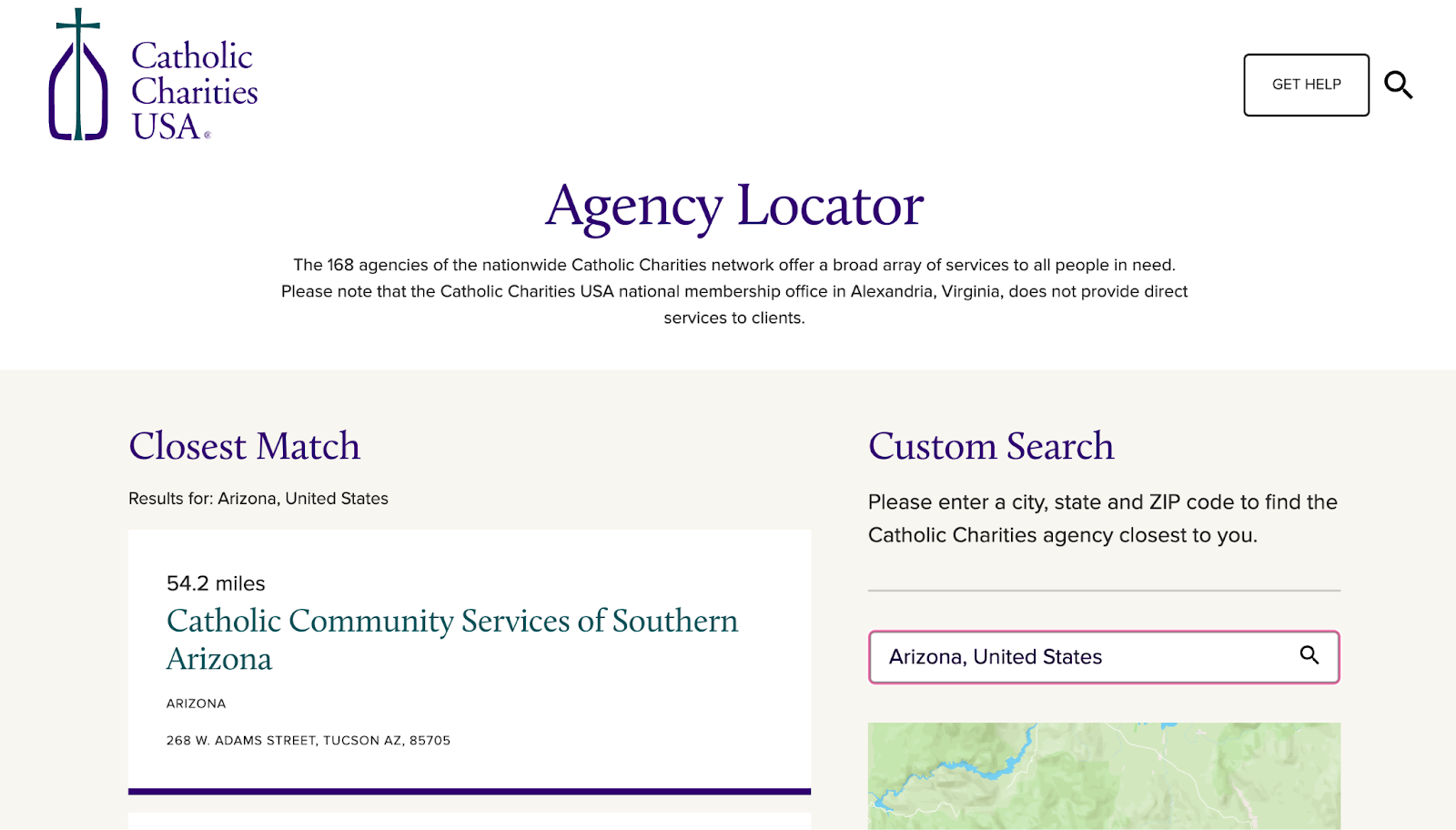
Pros:
- Provides critical aid to low-income families in urgent financial distress
- Partners with funeral homes to ensure dignified services at reduced rates
- Direct payment model means families don’t have to handle bills or reimbursements
- Offers additional support services beyond funeral assistance, including counseling
- Compassionate approach rooted in faith and community service
Cons:
- Primarily serves residents of the Diocese of Charlotte (46 counties in North Carolina), limiting geographic reach
- Only covers specific funeral services outlined in their agreements with funeral homes
- Does not pay for transportation of remains out of state or country
- Limited program capacity, helping about 17 families per month on average due to funding constraints
5. GoFundMe: Best for Community Crowdfunding and Memorial Tributes
Who it’s for: Families who want to quickly raise funds for funeral expenses by rallying support from friends, neighbors, and the wider community
Pricing: No platform fee. Standard payment processing fees apply (2.9% + $0.30 per donation)
Features:
- Lets you create an online fundraiser in minutes to cover funeral, burial, or cremation costs
- Share a personalized campaign page with photos, stories, and donation goals
- Collect donations quickly, with the option to withdraw funds as they arrive
- Offers message templates and tips for writing compelling, respectful requests
- Transparent tracking of donations, making it easy to see and thank supporters
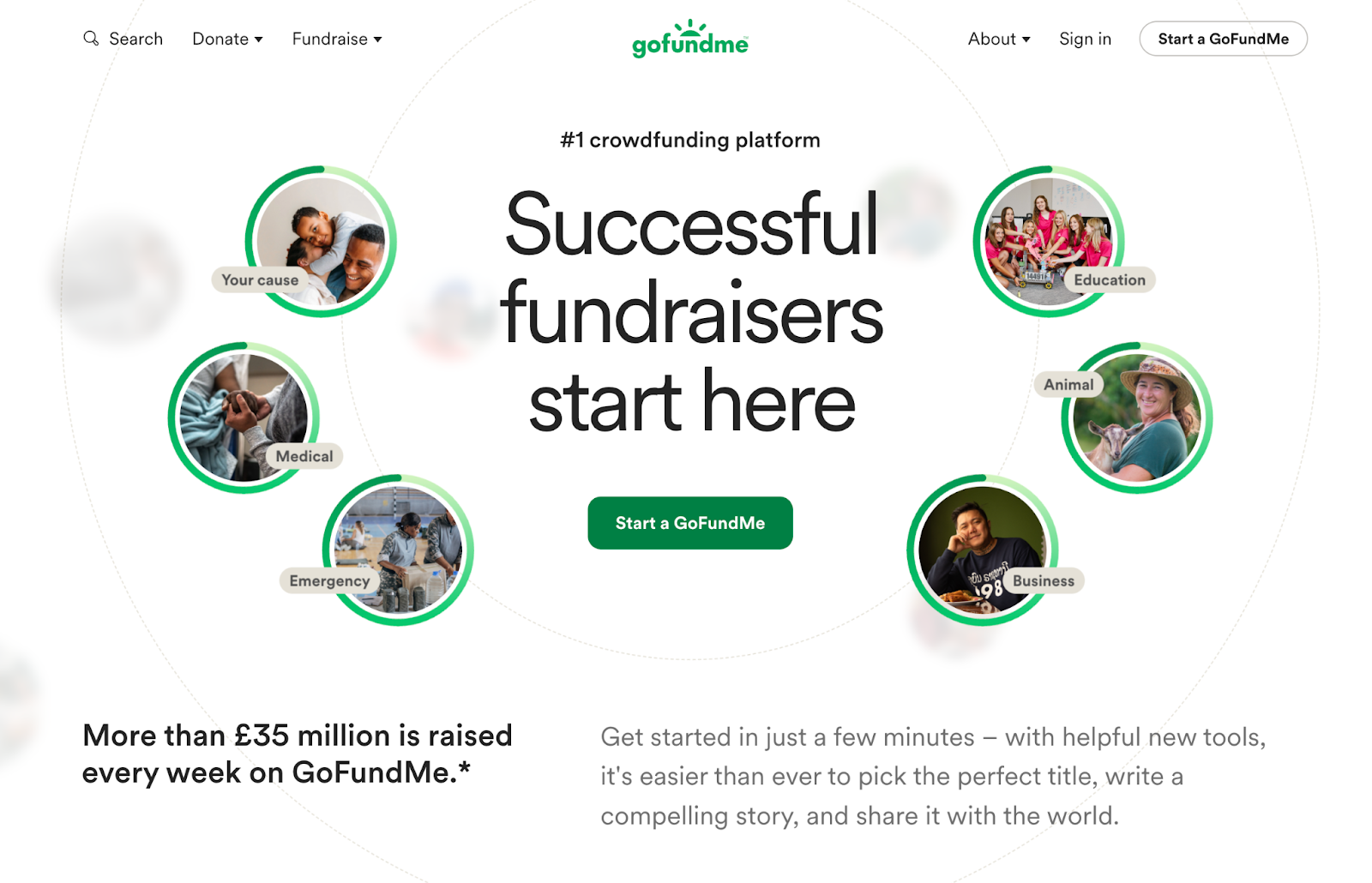
Pros:
- No upfront cost to start a fundraiser
- Fast access to funds as donations come in
- Easy to share widely through social media, email, and text
- Can serve as an online memorial page for community support and remembrance
- Detailed guidance on how to ask for help in a thoughtful, effective way
Cons:
- Requires time and energy to set up and promote, which can feel overwhelming during grief
- Success depends on the size and engagement of your personal and social networks
- Payment processing fees deducted from donations
- Donations are not guaranteed and may fluctuate day to day
(Note: GoFundMe is not a traditional charity. Instead, it provides a secure, trusted platform where families can share their story and receive community support for funeral costs.)
6. Funeral Consumers Alliance: Best for Saving Money Through Education and Advocacy
Who it’s for: Individuals and families who want to make informed, budget-friendly funeral choices and avoid overspending during a difficult time.
Pricing: Free educational resources. No direct financial assistance, but potentially significant savings through guidance and cost comparisons
Features:
- Nationwide network of nonprofit affiliates dedicated to educating consumers about funeral planning and costs
- Offers step-by-step guidance on how to budget for funeral expenses without sacrificing financial stability
- Provides cost-comparison tools and local resources to help families avoid paying thousands more than necessary
- Advocates for legislative changes to improve transparency and affordability in the funeral industry
- Serves as a resource for consumers facing funeral-related issues, helping refer complaints to appropriate regulatory agencies
- Promotes freedom of choice and ethical decision-making aligned with consumers’ religious, cultural, and personal values
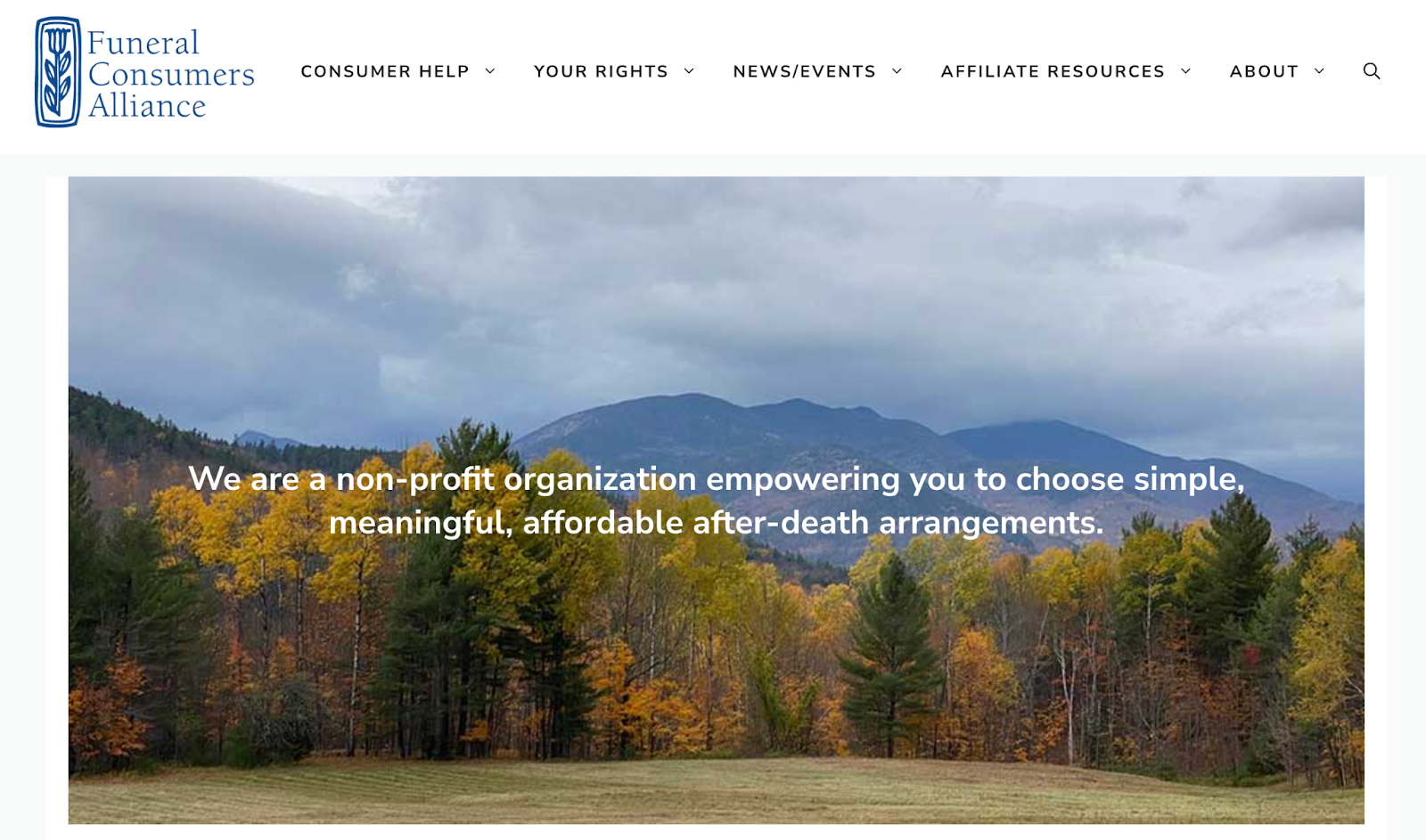
Pros:
- Empowers families to avoid overspending on funeral costs through education
- Offers practical budgeting tools and advice
- Nationwide network makes it easier to find local pricing data and consumer support
- Advocates for systemic changes in the funeral industry to protect consumers
- Completely nonprofit and driven by consumer interest rather than profit
Cons:
- Does not provide direct financial assistance or pay funeral expenses
- Requires families to take an active role in researching and shopping around, which can be difficult during mourning
- Savings vary depending on local funeral home participation and available data
7. State & County Burial Aid: Best for Local Government Funeral Assistance When No Other Help Exists
Who it’s for: Families with low income or limited financial resources who have no other way to pay for funeral or cremation costs. State programs provide burial assistance for the uninsured so families can lay loved ones to rest with dignity.
Pricing: Varies widely, assistance can range from a few hundred to several thousand dollars, often paid directly to funeral providers
Features:
- Every state has its own rules, budget, and eligibility requirements for burial assistance programs
- Driven partly by public health concerns to ensure that even low-income residents receive a dignified burial or cremation
- Programs often administered through local city or county offices, departments of health, or human services
- Some municipalities offer discounts on burial plots in public cemeteries for residents
- Benefits often paid directly to funeral homes rather than families
Pros:
- Provides a crucial safety net for those without other resources
- Can reduce or eliminate funeral costs for low-income families
- Often coordinated locally, making it easier to connect with someone in person
- Can include related services like burial plots or transportation of remains
Cons:
- Highly variable by state and county, creating confusion for grieving families
- Funding is available only as a last resort after all other options are exhausted
- Benefits often modest and may not cover all expenses
- Applications can be complex and require gathering significant documentation quickly
- Payments typically go to funeral providers, leaving families unable to use funds flexibly
8. Military Burial Benefits for Veterans: Best for Honoring Veterans with Financial and Ceremonial Support
Who it’s for: Families of veterans or active-duty military members seeking financial assistance and honors for funeral and burial services
Pricing: Up to $2,000 for service-related deaths, $796 for non-service-related deaths; additional benefits for burials in VA cemeteries
Features:
- Spouses may qualify for additional benefits under the Servicemember’s Civil Relief Act (SCRA).
- Veterans buried in a VA national cemetery receive a grave opening and closing, a government-furnished headstone or marker, perpetual care of the gravesite, and a burial flag presented to the next of kin.
- You must apply for benefits, and then show documentation of the veteran’s service record and discharge status.
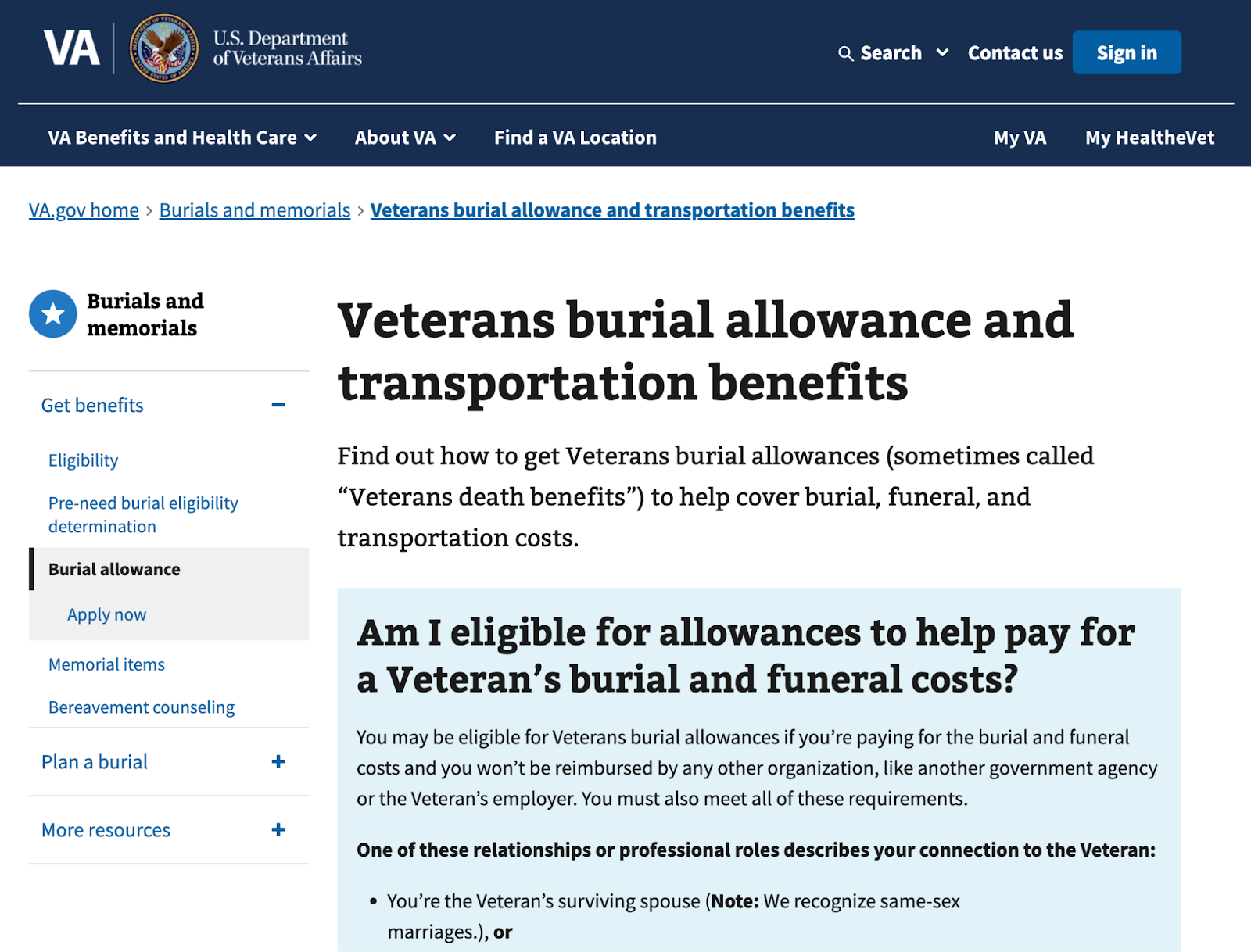
Pros:
- Helps reduce financial burden for military families
- Ensures veterans receive dignified burials and national recognition
- Additional ceremonial honors like burial flags and headstones reinforce a sense of respect and gratitude
- Burial in VA cemeteries offers significant long-term savings for families
Cons:
- Benefits can be modest compared to actual funeral costs
- Requires paperwork and proof of military service, which can be overwhelming during grief
- Only certain costs are reimbursed; many funeral expenses remain out-of-pocket
- Benefits may not be sufficient for higher-cost services or private cemetery fees
How We Researched These Resources
We created this list by evaluating each organization and platform against three key criteria.
Relevance and scope
We included only organizations and programs that directly help with funeral or cremation costs. We excluded those that offer only general grief counseling or broad family support. Each resource on our list provides financial aid, discounted services, or practical tools to lower funeral expenses.
Accessibility and fairness
We ranked programs higher if they serve a broad audience. We looked for programs that don’t require upfront payments and that keep their application processes reasonable. We valued organizations that treat all families with dignity, no matter their income or background.
Speed and transparency
Families often need help quickly after a loss. We gave preference to resources that clearly explain costs and respond promptly. We chose organizations that make their application process easy to understand. We rated organizations higher if they publish detailed guidelines, offer personal support, and answer questions quickly.
What Does Funeral Assistance Entail?
Funeral assistance helps families cover the costs of burying or cremating a loved one when they don’t have enough money saved. These expenses often add up fast and can come as a shock during an already painful time.
In 2022, the median cost of a traditional burial reached $7,848, while cremation averaged $6,970. Depending on choices like caskets, transportation, and services, a funeral can cost $12,000 or more.
Many communities run funeral assistance programs to ease the financial burden on grieving families. This could include:
- Direct financial aid gives families money to pay funeral bills, such as cremation fees, burial costs, or the price of a memorial service.
- Local offices manage burial assistance programs that pay funeral homes directly for services.
- In-kind donations provide essential items or services at no cost, like grave plots, caskets, urns, or transportation for the deceased.
- Discounted services lower the price of funerals because charities, nonprofits, or government programs work out special rates with funeral homes or cemeteries.
- Education on low-cost options teaches families how to plan funerals wisely, compare prices, and avoid paying for services they don’t need.
Families can find help through government programs, veterans’ benefits, charities, local county services, or online fundraising platforms like GoFundMe. Funeral assistance exists so families can honor and remember their loved ones without facing overwhelming debt.
Cremation vs. Burial Costs: What’s More Affordable?
Cremation now accounts for roughly 60% of all funerals in the United States. Experts predict this rate will rise to nearly 80% by around 2035.
More Americans are choosing cremation as a cost-saving option for end-of-life arrangements. By 2045, cremation is expected to climb to 82.1%, showing how families continue to shift toward more affordable choices.
Costs play a big role in these decisions. In 2023, the median cost of a funeral with a viewing and burial was $8,300, while the median cost for a funeral with cremation was lower at $6,280.
Direct cremation, which skips the traditional service, can reduce costs even further. It’s usually between $795 and $3,200, depending on the provider and region.
Burial costs remain higher because they include expenses like caskets, burial plots, and grave preparation. Caskets alone can range from $2,000 to $3,000. Funeral homes charge service fees that might be upwards of $2,000.
By comparing prices locally, families can avoid paying more than necessary for the same services. Families should consider their budget, personal beliefs, and any wishes left by their loved one when deciding between cremation and burial.
What To Do If You Still Can’t Afford a Funeral?
If you’ve explored different charities and programs but still feel overwhelmed by costs, know that you have other ways to honor your loved one without spending more than you can manage.
Consider hosting a simple celebration of life at home or a local park instead of paying for a traditional funeral service. You can gather close friends and family to share stories, photos, and music that remind you of the person you’ve lost. This type of gathering often feels more personal and costs very little beyond food or small decorations.
Another option is to choose direct cremation without a formal service right away. Direct cremation skips the viewing, embalming, and ceremonies that add significant costs. It’s the most affordable way to handle after-death care while still giving you the chance to plan a memorial later, if and when you’re ready.
Companies like After specialize in making direct cremation simple and affordable. When you visit After.com, you’ll see cremation packages starting around $995 (example pricing from Arizona), with transparent pricing and no pressure to buy extra services. Families can handle everything online, which often feels less stressful and helps avoid surprise costs.
If you choose cremation, remember that you can hold a memorial at any time in the future, even months or years later, when you feel emotionally and financially ready.
Above all, try not to feel pressured to spend beyond your means. A meaningful farewell doesn’t depend on how much you pay. It comes from the love and memories you share.
Create a Plan That Works for You. No Pressure, Just Support
It can be overwhelming to make cremation arrangements and find charities that help with funeral costs. The process is quite unfamiliar to most people. That’s why we aim to make cremation planning as simple, transparent, and compassionate as possible.
{{cta_blue}}
Frequently Asked Questions
What Is the Best Charity for Funeral Cost Assistance?
The best charity for funeral cost assistance depends on your specific situation.
For example, The TEARS Foundation helps families who’ve lost infants or young children, while Catholic Charities assists low-income families with burial costs in certain regions. If you need help for a child’s funeral, groups like Final Farewell might be the best fit.
Always check each organization’s eligibility rules and service areas before applying.
Can I Get Help if I’m Uninsured or Low Income?
Yes, you can get help with funeral costs if you’re uninsured or have a low income. Many charities, county programs, and even funeral homes offer assistance for families who can’t afford services. For instance, some counties provide burial aid for residents with limited financial resources.
You should contact local social services or funeral directors to see what help is available in your area.
Does Medicaid Cover Funeral or Cremation Costs?
Medicaid does not directly cover funeral or cremation costs. However, some states link burial assistance programs to Medicaid eligibility, offering limited help to cover basic costs. For example, states like Indiana, Colorado, Wisconsin, and Wyoming offer small benefits to qualifying Medicaid recipients.
Always check with your state’s Medicaid office or Department of Human Services for details.
Can I Get Help With Cremation Only?
Yes, you can get help specifically for cremation costs. Many charities and government programs cover cremation expenses, especially if you choose direct cremation without a formal service. Companies like After.com offer affordable direct cremation packages starting around $995 in some regions, helping families avoid high funeral home costs.
How Do I Start a GoFundMe for a Funeral?
You can start a GoFundMe for a funeral by visiting the GoFundMe website and clicking on “Start a Fundraiser.” Write a clear title, share your loved one’s story, and explain how the funds will help cover funeral costs. Be honest and specific about expenses, like cremation fees, burial plots, or transportation.
Share your fundraiser on social media and through personal messages to help you reach more people who can support you.
Is Same-Day Funeral Assistance Available?
Same-day funeral assistance is sometimes available, but it is often hard to find. Some programs move quickly in emergencies. You should call local charities, county social services, or funeral homes directly and explain your situation.
Funeral homes can occasionally help arrange a simple service or direct cremation immediately, especially if you can show financial hardship.
Are There Programs That Help With Memorials, Too?
There are programs that help with memorial costs as well as funeral expenses. For instance, After.com’s Summit package includes tools for creating a DIY memorial video and printed funeral programs. Charities may also offer discounts or resources for memorial services.
Always ask any organization or funeral provider if they offer help with memorial materials or ceremonies.
What Documents Will I Need to Apply for Funeral Aid?
You usually need several documents when you apply for funeral aid. Most programs require a death certificate, proof of your identity, and documents showing funeral expenses like invoices or contracts.
Some programs also ask for income verification or proof of financial need. It helps to gather these papers in advance to speed up the application process.
Dallin Preece
CRO, After.com - Cremation & Preplanning Divisions
Published Date:
July 23, 2025


.jpeg)


%20(1).png)
%20(1).png)


%20(1).png)
%20(1).png)
%20(1).png)
%20(1).png)
%20(1).jpg)
%2520(1).png)
